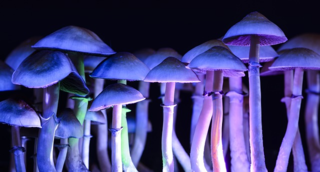Psychedelic-Assisted Therapy
Psilocybin as a Promising Treatment for Alcohol Use Disorder
New research confirms the benefits of this form of psychedelic-assisted therapy.
Posted September 9, 2022 Reviewed by Ekua Hagan
Key points
- A new study found that psilocybin in combination with psychotherapy helped participants significantly reduce drinking for at least eight months.
- This new research represents In the largest clinical trial (and what may be the first randomized, controlled trial) of its kind.
- Although the mechanisms of psychedelic-assisted treatments remain uncertain, the action of these drugs seems to enhance neuroplasticity.

Once in a while, you can get shown the light in the strangest of places if you look at it right. —Robert Hunter
Believe it or not, in the 1950s and ‘60s, scientific research on the therapeutic effects of psychedelics was not uncommon. A meta-analysis of results from six randomized clinical trials published between 1966 and 1971 revealed that participants with alcohol dependence treated with lysergic acid diethylamide (LSD) demonstrated remission during follow-up nearly twice as often as those in control groups.[1]
In fact, after his first experience with LSD as part of an experiment at the VA hospital in Los Angeles in 1956, Bill Wilson, co-founder of Alcoholics Anonymous, came to believe its use could be of considerable benefit in the treatment of alcoholism (though this sentiment was widely criticized within the abstinence-based mutual-aid fellowship he was instrumental in creating). However, when LSD became illegal in the U.S. in 1968, all such research came to an abrupt halt.
Over the last several years, there has been a re-emergence of research exploring whether psychedelic-assisted therapy—including therapy using ketamine and psilocybin, the active component in magic mushrooms—can be a more effective alternative to existing mental health (most notably depression) and addiction treatments. Earlier research from institutions around the world has indicated that psilocybin has the potential to treat a variety of addiction disorders, including those related to alcohol, opioids, and nicotine. While the results thus far have been generally positive, these studies have been extremely limited in size and scope.
In the largest clinical trial of its kind and what may be the first randomized, controlled trial of its kind, New York University (NYU) Langone Health Center with researchers from the University of Alabama at Birmingham and the University of New Mexico evaluated the efficacy of psilocybin-assisted psychotherapy for the treatment of alcohol use disorder AUD. Just published in JAMA Psychiatry, this multi-site study found that two doses of psilocybin in pill form, in combination with psychotherapy, helped participants significantly reduce drinking for at least eight months after their first treatments.[2]
During the 8-month clinical trial, 93 men and women ages 25 to 65 received either two psilocybin doses or antihistamine pills used as a placebo. All participants also engaged in 12 psychotherapy sessions utilizing motivational enhancement therapy and cognitive behavioral therapy.
As part of the trial, participants underwent four psychotherapy sessions before they took the first dose of psilocybin, with the amount based on body weight, or the antihistamine. Participants were given eye masks and headphones that played classical music and asked to state intentions, such as finding inner peace. The psychedelic sessions lasted eight hours with therapists in the room, and blood pressure and heart rates were regularly monitored. Four additional therapy sessions followed the first dosing and if there were no adverse reactions, the second psilocybin session took place.
Prior to the study, participants averaged 7 alcoholic drinks at a time. The primary outcome measured was the percentage of heavy drinking days, assessed using a timeline follow-back interview, contrasted between the two groups over the 32-week period following the first administration of the study medication.
Psilocybin administered in combination with psychotherapy produced robust decreases in the percentage of heavy drinking days over and above those produced by active placebo and psychotherapy. More than 80 percent of those who received psilocybin dramatically reduced their drinking eight months after the study started, compared to just over 50 percent in the antihistamine control group. At the end of the trial, half of those in the psilocybin treatment group had quit drinking altogether, compared to about one-quarter of those who received the antihistamine.
Talk therapy is an essential part of the process
Professional supervision by trained therapists to help patients prepare for and deal with psychedelic experiences that can be extremely intense and challenging in combination with psychotherapy is fundamental to successful outcomes. Potential adverse effects are not to be taken lightly and psilocybin and other psychedelics alone have not been shown to be an effective treatment for addiction. In the current study, the therapy component included motivational interviewing and cognitive behavioral therapy for AUD as well as psychoeducation and other material designed to help the participants to manage and make therapeutic use of the psychoactive effects of the psilocybin administered.
How psychedelics rewire the brain
Psychedelic substances are known to alter thought processes, expand perspectives, and potentially inspire spiritual experiences, including creating or deepening a sense of connection with that beyond self. This is entirely consistent with my lived experience as someone with dozens of decades-ago psychedelic episodes (and long before entering personal recovery in 2006). In this study, participants who received psilocybin twice within the 12 weeks reported meaningful experiences or visions that changed their relationship with addiction.
Addiction is a disorder of isolation while recovery is a process of connection and reconnection. Although the specific mechanisms of psychedelic-assisted treatments remain uncertain, the action of these drugs seems to enhance neuroplasticity—altering neural pathways, cognition, affect, and behavior—in ways that increase psychological flexibility. There is an accumulating body of evidence that psilocybin and other psychedelics with similar effects on brain functioning can be effective in treating different forms of addiction by reshaping the neural networks in the brain associated with addiction-related habits and help loosen the bonds of rigid thinking patterns—reducing substance-focused obsessive thoughts and diminishing the tunnel vision and gravitational pull of cravings.
The results of this new research provide compelling support for larger trials as part of the further study of psilocybin-assisted treatment for AUD as well as other addictive disorders.
Copyright 2022 Dan Mager, MSW
To find a therapist, please visit the Psychology Today Therapy Directory.
References
[1] Krebs TS, Johansen PO. Lysergic acid diethylamide (LSD) for alcoholism: meta-analysis of randomized controlled trials. J Psychopharmacol. 2012;26(7):994-1002. doi:10.1177/0269881112439253
[2] Bogenschutz MP, Ross S, Bhatt S, et al. Percentage of Heavy Drinking Days Following Psilocybin-Assisted Psychotherapy vs Placebo in the Treatment of Adult Patients With Alcohol Use Disorder: A Randomized Clinical Trial. JAMA Psychiatry. Published online August 24, 2022. doi:10.1001/jamapsychiatry.2022.2096
https://jamanetwork.com/journals/jamapsychiatry/fullarticle/2795625




